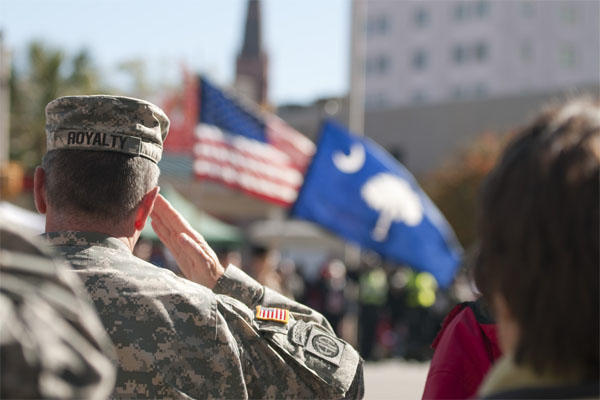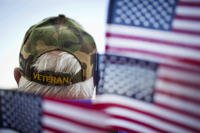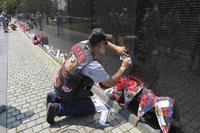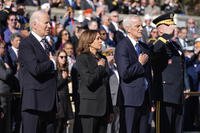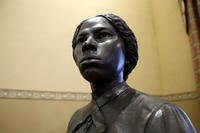The following remarks are contributed by the U.S. Army in honoring Veterans Day.
For the last century, we have celebrated our Veterans on this day. When the cannons of World War One were silenced, we thought we had fought the "war to end all wars," but as history proved, we still needed our Soldiers.
Peace, though fragile as fine china, is often wrought from hands once strong enough to toil at the anvil of war.
We are here to celebrate the strength, courage and dedication of our veterans who not only wield the hammer of conflict but also shape the world for lasting peace.
The brave actions of our veterans endure in the pages of history. Today I want us to not only remember their gallantry on the battlefield; we must look at the lasting legacy of strength and service they brought with them when they returned home.
If you walk away remembering three things, you will understand what our veterans do for this nation and what we can do to help them.
First, our Soldiers, our veterans, are Soldiers for life. During their careers and their lives, and you can see this throughout history, they continue to improve their skills, ensuring they remain strong for themselves, their families, their communities and their nation.
Second, the Army is committed to lifelong success for our Soldiers, veterans, and their families by connecting them with opportunities for employment, education and health care, post military service.
Finally, we can't do this alone. Supporting our Soldiers and Army veterans requires a team approach by the Army, other government agencies, and the local community.
Serving Strong
First, a Soldier is a Soldier for life.
It takes a profound strength to wear this nation's uniform. Though one day they remove this uniform, no amount of time, nor strife, can sever the golden thread uniting these veterans in a unique and everlasting bond.
Once a Soldier, a Soldier for Life
This uniform has changed many times in the last 237 years. What hasn't changed has been the determination and spiritual strength of the men and women willing to serve this nation.
The image of a veteran, however, has changed. Almost half of those serving in the military are between 22 and 30 years old. Now, America has the largest population of young veterans since the Vietnam War.
As we near the conclusion of combat operations in Afghanistan, the Army will get smaller over the next five years. More than 130,000 Soldiers will leave the Army this year, and more than 500,000 by 2017.
But as they follow in the proud footsteps of the men and women who served in the Army and then served in their communities, they bring with them the uncommon and unwavering strength common in our veterans.
After World War II, 15.7 million veterans returned home, and many feared the possibility of not having a job when they returned.
In 1944, President Franklin Delano Roosevelt signed the Servicemen's Readjustment Act. We know it today as the GI Bill.
The GI Bill constructed facilities for veterans, authorized unemployment compensation of $20 per week for a maximum of 52 weeks, offered job placement aid for vets and provided up to four years of education and training.
More than half of all veterans used the education benefits. In fact, three years after it was passed, veterans made up 49% of all college admissions. Drawing from their experience in the military, these students earned a reputation for their unwavering commitment to learning.
But these veterans were not alone in their efforts. The public rallied around veterans, and employers were eager to hire them.
A professor of management at Pepperdine University's School of Business and Management said, "As traumatic and devastating as World War II was in terms of loss of life, those that came back alive were heroes. If there was a choice to make, the veteran would be the one who was hired."
Veterans proved themselves more than capable of not just adjusting to their new civilian roles; they were excelling. By 1965, veterans made on average 60% more than civilians, the veteran unemployment rate was about half that of civilians, and veterans' children were more likely to attend college as well.
In fact, the GI Bill has led to 14 Nobel laureates, two dozen Pulitzer Prize winners, three Supreme Court justices, three U.S. presidents and scores of other leaders. The list includes venture capitalist Eugene Kleiner, who helped create Amazon.com, and surgeon and astronaut Story Musgrave. It also includes the likes of Johnny Carson, Harry Belafonte and retired Kansas Sen. Bob Dole.
By Vietnam, the strength of our Soldiers and our veterans had not changed; what changed was the public's attitude toward them.
That generation remembers returning from war to a country so divided and distracted by internal politics, the public had little interest in what our veterans had been doing for the nation. These attitudes and misunderstandings about veterans during the Vietnam era sadly limited the potential success of many members of one of our greatest generations of heroes.
Army Working with DoD
Every one of our Soldiers, veterans and their families deserve to be applauded for their strength, devotion and service to this nation. Though we come here today to thank them for their service, we know they deserve so much more.
They deserve every opportunity to use the skills, knowledge, leadership and experience they gained during their time in the military.
That brings me to my second point: The Army is totally committed to doing that.
The Army is working with the Departments of Defense, Labor, Veterans Administration and local communities to transition and reintegrate Soldiers and Army veterans into civilian life.
Our President is leading the charge. Earlier this year, the President signed the "VOW [Veterans Opportunity to Work] to Hire Heroes Act," giving tax credits for businesses that hire unemployed and disabled veterans.
In August last year, President Obama directed the DoD and VA to redesign the military's Transition Assistance Program -- the first time this has been done in more than 20 years.
These changes are designed to assist separating Soldiers to successfully transition to the civilian workforce, start a business or pursue training and higher education.
In the Army, there are multiple efforts to improve this transition process, including changes to the Alumni Army Career and Alumni Program, the Hero 2 Hired Employment Application Tool, the Employer Partnership of the Armed Forces and the Military Spouse Employment Partnership.
Our Soldiers, veterans and families have given so much. It is our sacred duty to maintain their trust and faith and remind them they will always remain the Strength of the Army and the Strength of this Nation.
Once a Soldier, A Soldier for Life
Throughout their lives, men and women live by a professional ethos that asserts, "I will never accept defeat," and, "I will never leave a fallen comrade behind."
These men and women are willing to toil and sacrifice for the small band of brothers who stand unwavering to their left and right. They draw their courage from the wellspring of our history and from the legacy of strength they have inherited from those that marched tirelessly before them.
But these Soldiers -- our veterans -- don't see themselves as being brave or special; they just say they're doing their jobs.
Since the attacks of Sept. 11, 2001, almost three million American men and women have answered our nation's call to arms -- to serve their nation and do their job. Now, after 11 years of war, more than 1.3 million servicemen and women who deployed overseas have returned to our communities. But still, more than 720,000 veterans of all generations remain unemployed. The numbers are getting better, but we still have a long way to go.
Team Approach
When young people join the Army, they join a special team -- a unique and honored family. When they train, they do not train alone. When they deploy, they have a battle buddy, a squad, a platoon, a battalion. Everything they do is with a team -- for a team.
In fact, Soldiers spend very little time alone. Our Soldiers -- our veterans -- should never have to struggle alone as they transition to a civilian life.
Once a Soldier, a Soldier for Life
That brings me to my final point: Supporting our Soldiers and veterans requires a team approach by the Army, other government agencies and the local community.
We cannot do this alone.
Just as a nation rallies for the troops in a time of war, the same country must rally for its veterans during times of peace.
On Veterans Day, Remembrance Day, Armistice Day or the Day of Peace -- this day has many names -- the world stops in silence to pay tribute to the heroes of the battlefield who never see themselves as heroes. To that, I say we owe veterans more than our silence, our memories, our thanks.
President Kennedy once said, "As we express our gratitude, we must never forget that the highest appreciation is not to utter words, but to live by them."
When we think of how much our veterans and their families have done for our nation, how do we honor their sacrifice?
How do we celebrate their service?
How do we do these things in a meaningful way?
How do we make a difference in the lives of the men and women who have made such a difference in our lives?
Soldiers and Veterans don't see themselves as being brave or special; they just say they were doing their jobs. But what of their jobs when they leave the service?
What can each of us do?
Encourage businesses to hire a veteran or military family member: Soldiers bring exceptional training, values and experience to their civilian jobs. The leadership and technical skills we develop in the military make us valuable additions to any organization.
Veterans make exceptional employees in any organization, because in serving their country, they have acquired invaluable skills, including:
- Decision-making skills primed by quick, clear thinking.
- Proven leadership skills, honed in the most challenging operational environments.
- The knowledge and experience needed to be sophisticated team builders and natural team players.
- A work ethic that demonstrates an unwavering commitment to excellence.
Spread the word: If you know of an organization that wants to help veterans, encourage them to register with the National Resource Directory so wounded, ill and injured service members and their families can access information about the services you provide.
Volunteer in your community: Get involved with local organizations in your hometown to make a difference in the lives of wounded warriors and their families.
I encourage you to see the strength of our veterans and their families and look for ways to help them.
Just remember as we go forth today, our Soldiers are Soldiers for life. They are strong and resilient, creative and determined. I am confident this generation will join the remarkable generations of men and women who wore this uniform and left an enduring mark on this nation.
Let's get out there to work together and ensure our veterans have every opportunity to reach their highest potential. We have some great young men and women counting on us to come through for them and their families. Let's not let them down.
Let your words bring forth action. Think of their service and their sacrifice. Don't just say "thank you" to our veterans. Show it.
Want to Know More About the Military?
Be sure to get the latest news about the U.S. military, as well as critical info about how to join and all the benefits of service. Subscribe to Military.com and receive customized updates delivered straight to your inbox.
